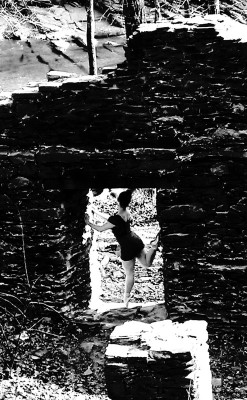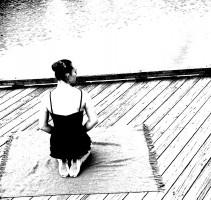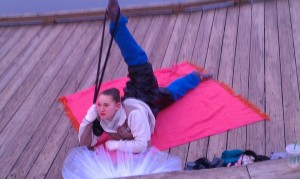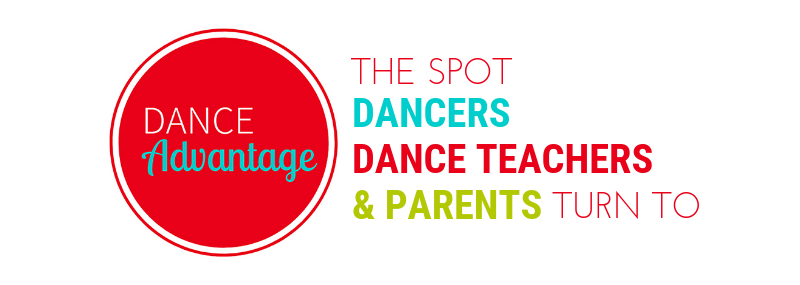After years of just asking, Noa Erlitzki demanded to start ballet classes once and for all.
Born in Haifa, Israel she remembers feeling like she was supposed to dance from a young age, but her parents never signed her up. Later, when her family moved from California to Atlanta, it seemed like a good time to start something new and Noa insisted upon ballet.
So, at the relatively late age of 11 years old, she began at Susan Chambers School of Theater Dance with teacher Natalia Shevchenko.
I’ve come to know Noa as a fellow dance blogger and she recently announced some very exciting news. She’s been accepted to study ballet starting in September 2012 at one of Russia’s premiere institutions, Perm State Ballet School (featured on film in Captives of Terpsichore and A Beautiful Tragedy). Noa is the first Israeli to be accepted to study at Perm and is one of only a few students from America to be granted this opportunity.
While traveling by plane to Israel from Salzburg, where she participated in Salzburg International Ballet Academy‘s summer ballet program, Noa took some time to share her story. She is frank about having a body type that is considered less than ideal for ballet, her experiences abroad, and the challenges in fulfilling and funding her dream.
 Dance Advantage: At what point did you know you wanted to seriously train in ballet in order to become a professional?
Dance Advantage: At what point did you know you wanted to seriously train in ballet in order to become a professional?
Noa Erlitzki: I remember coming off of the stage and into the wings during my first recital and thinking, “This is what I want to do – I want to be a ballerina!” My teacher was watching from the wings and as soon as I reached her I asked her if I could start pointe the next year!
It makes me laugh now to think how naïve I must have seemed. But I did end up starting pointe the year after when I trained for a while at Rotaru International Ballet School, and that’s when I consider my serious training to have begun.
DA: Who in your life has helped make serious training possible?
NE: My support system is comprised of so many amazing people.
I feel so lucky to have parents that support me in whatever I choose to do. I think it took a while for them to accept that I want to live my life as a ballerina, but the idea grew on them and even from the beginning they were always there for me in every way. I owe them so much.
My ballet teacher has played a huge role in my life. I credit much of my personal growth and development as a dancer to her. I believe that having a good support system is critical in a world where rejection and harsh criticism is commonplace. I really don’t know what I would have done without these people in my life to turn to when things get hard (and they do get hard)!
DA: What is the greatest obstacle you’ve had to overcome to get where you are in your training?
NE: My greatest obstacle is, without a doubt, my body. I’ve made amazing progress in changing and developing it in the past several years, but it’s a struggle every day and I work very hard to continue shaping it into the way it ‘should’ be.
 Even so, I also consider it one of my greatest assets. I went into ballet knowing full well that I would be going against my body’s nature, but since the beginning, that thought has always been a big motivator to push harder and keep going. I’ve always gone into class with the mentality that I will prove everyone that doubted me wrong, that I will prove to myself that I can do it despite not being born with the “perfect” body. The acknowledgement of the fact that I will have to work harder than other dancers who were born with a more forgiving body for ballet has resulted in me really putting my best foot forward and trying my hardest every time.
Even so, I also consider it one of my greatest assets. I went into ballet knowing full well that I would be going against my body’s nature, but since the beginning, that thought has always been a big motivator to push harder and keep going. I’ve always gone into class with the mentality that I will prove everyone that doubted me wrong, that I will prove to myself that I can do it despite not being born with the “perfect” body. The acknowledgement of the fact that I will have to work harder than other dancers who were born with a more forgiving body for ballet has resulted in me really putting my best foot forward and trying my hardest every time.
I think that if ballet didn’t pose a challenge, I would not be as passionately determined to make it work for me!
DA: So the challenges motivate you, but how exactly do you overcome traditional expectations of body type in ballet and reach your goals?
NE: Ever since the moment I formed the goal of becoming a ballerina and decided that I would make it happen, I can’t see my life going in any different direction. So definitely, my biggest motivator is just the idea that I must do it. I just feel like I have to dance, I can’t not! Besides that, it’s my desire to do something amazing, to live a life that very few people get to live, to be able to feel proud when I tell people what I do or what I want to do “when I grow up.”
As for how I am doing it – well, it’s a lot of hard work! I dedicate every minute of my day to ballet. Most of my time is spent stretching, swimming, at the physiotherapist, doing exercises, and of course in ballet class – and it’s not just doing all this stuff, it’s really giving 110%.
The harder part is psychological because I am only human . I have off days and it’s a huge challenge to pull myself together during those tough times and keep going. But I overcome it by just promising to myself that I will do it no matter what. It’s a struggle every day, but that only makes for a bigger achievement once I succeed. And it makes me feel good to think about how far I have come.
DA: Why and how did you start blogging and what has it done for your dancing?
NE: I started blogging last fall after being urged to do so by a few people who had read some journal-type entries I posted online. At first, while the idea interested me, I feared that I wouldn’t have enough to write about. It wasn’t until I broke my foot in September that the idea grew on me and I decided to go ahead and start my blog.
For the two months I spent on crutches, I still watched every single class, but I found the waiting and urge to dance very difficult to deal with and blogging was a way for me to stay active in ballet while I was unable to do so in the usual way.
I didn’t start blogging with the intent to use it as a tool to improve my dancing, but ultimately it has done so and it was a pleasant surprise. Writing about ballet somehow gives me a better understanding of my own dancing, and writing about my own dancing makes for a fun way to share my progress. I find it to be very encouraging and motivating.
DA: When did you set your sights on Perm and what was the process of gaining acceptance to the school?
NE: I spent so many years watching YouTube videos of ballet students in Russia just wishing I could have that childhood and ‘knowing’ that it would never happen.
When I started hearing about Joy Womack getting into Bolshoi, it hit me that it might just be possible! It took about two years from that point for me to really realize that it could be a possibility for me. Even though almost everyone told me that the chance of me getting in would be small, I couldn’t just not try!
 I set my sights on Perm specifically because the foreign program is less developed than in Bolshoi and I felt that this would better enable me to fully immerse myself in the Russian ballet culture and plunge head-first into the raw Russian training. I think Perm is a better fit for me than Vaganova or Bolshoi and I am just so drawn to it. I am very happy to be going there – I feel as if it is meant to be.
I set my sights on Perm specifically because the foreign program is less developed than in Bolshoi and I felt that this would better enable me to fully immerse myself in the Russian ballet culture and plunge head-first into the raw Russian training. I think Perm is a better fit for me than Vaganova or Bolshoi and I am just so drawn to it. I am very happy to be going there – I feel as if it is meant to be.
DA: What are the financial realities of studying abroad at a prestigious school?
NE: Tuition for one year costs $13, 570. In addition, I have to be able to pay for flights to and from home; we are required to go home on school holidays in the winter and in the summer. Then, of course there is the pointe shoe expense.
Moving to live abroad also means arranging for a cell phone in a new country, clothing for the different climate (Perm reaches temperatures of -30º C or colder in the winter), visa fees, and so on.
It adds up quickly and it is a big difficulty my family is facing now. The idea of having to give all this up because of not being able to fund it is not a thought I like to think, but it is a reality that I may have to face if I don’t succeed in finding funding, or partial funding.
DA: If someone would like to donate or help you reach your goals, how can they do so?
NE: Ideally I will be able to find a sponsor who could support me throughout my training in Perm, but as of yet I do not have a sponsor, so I am still looking.
I have set up a Go Fund Me project [visit www.gofundme.com/NoaBallerina] where I am trying to raise funds to cover one year’s tuition. On that same page, supporters can also donate toward a pointe shoe fund and a travel expenses fund. Any assistance I can get, no matter how big or small, will help my family tremendously. I will be forever thankful to donors! As well, any potential patrons who are interested in arranging sponsorship are encouraged to contact me, and I will gladly answer any questions you may have.
DA: Already this year you’ve traveled to New York City for YAGP, to Israel, and to Salzburg, Austria. What do you find hardest about leaving home for long periods?
NE: Definitely the most difficult part is not having my mom’s vegetable soup with me when I leave home. My mom makes this amazing vegetable soup that I love and I eat it almost every day. So, when I leave home for long periods, I really do miss it!
On a more serious note – although this wasn’t an issue in New York – something that I have a hard time with is being in completely different time zones. At home, if I’m feeling really down, I can always call my mom to talk to her and feel better; I realized how much I took this for granted while I was in Salzburg because I couldn’t just call her up whenever I felt like it. It’s definitely something I know now to expect to have to deal with when I go to Perm, where the time difference from Atlanta is 10 hours.
DA: When you travel, what are 3 things you simply could not do without?
NE: My cell phone (even if I can’t make phone calls overseas), my laptop (I am typing right now on the plane), and money. That sounds really boring, but those are definitely my lifelines! Although a close runner up would be pointe shoes, as least recently, because all my travels this year have revolved around ballet – just the way I like it!
DA: Tell us about one of your most surprising experiences while in another country.
NE: While in Salzburg this past month, I had no cell phone coverage – not even to communicate within Salzburg. I’m used to always having a phone, and I count on my phone to be there for me in case of an emergency, and I have said that I can’t imagine living without a cell phone or understand how people did it.
Well, not having the option to even use a cell phone this past month, in an unfamiliar country with a language I don’t know, has really opened up my eyes and made me realize that it is possible and is in fact quite nice. I’m not saying I’ll stop relying on my phone whenever I have one, but it’s a good feeling to know that I can get by without being connected all the time, and I feel that I have more trust in myself now. I even managed to find my way to the city center to get to the physiotherapist by bus with nothing but an address scribbled on top of a piece of paper!
DA: Tell us about one of your most incredible experiences while abroad.
NE: I find it so interesting to see, with my own eyes, the different cultures of different countries, and I find myself always comparing them to my own. Languages fascinate me too and I love to learn other languages. It is the experience of being abroad as a whole that seems to enrich my life and really bring some perspective into the way I see the world.
Maybe the most unique experience was spending this past month in Salzburg with dancers from, in total, 24 different countries. It is inspiring to see so many different languages and cultures and backgrounds mish-mashed together; and the most amazing part about it is that despite the language barriers, we all communicated with ballet as the base and we grew close to each other from there. I think that truly is incredible, and thought-provoking!
 DA: What are some things you’ve missed out on for the love of ballet? And do you sometimes wish you had more time for “regular” teenage activities or pursuits?
DA: What are some things you’ve missed out on for the love of ballet? And do you sometimes wish you had more time for “regular” teenage activities or pursuits?
NE: I went to a normal high school, so I went to Prom like everyone else, for example, but it never interested me so much. The saying “I’d rather be dancing” really applies to me!
I made a bit of an effort to act like a “regular teenager” sometimes, when the urge hit me. I think I went to a couple football games! (laughing) But overall, I lead a somewhat closed life. It’s not that I don’t go out with friends – I do, but not as frequently as most teenagers do. Friday nights are spent in the studio rather than at a party, and weekends are for all the homework I don’t have time to do during the week. But I do make an effort to save some free time for hanging out.
I don’t feel like I’m missing out because I’m doing exactly what I want to be doing, but I think it’s important to lead a social life no matter what profession you are in, so I do try!
DA: How has your study of ballet and your participation in dance helped in other aspects of your life?
NE: Oh, wow, ballet has helped in every single aspect of my life in so many different ways that I find it intimidating to even begin counting! I feel that it has given me so much strength and wisdom. Every time I grow as a dancer, I grow in depth as a person as well. I’ve developed emotional strength, physical endurance, a high pain tolerance.
Academically, it made me a smarter student. It taught me time management, I learned to think quickly, logically, and systematically. I used to hate math, but the year I started dancing seriously was also the year I began to really love math! Coincidence?
My grades in school shot up when I started dancing, and I now maintain a 3.9 GPA. I learned discipline, control, self-respect, and I gained a lot of confidence. I really could keep going on and on about all the ways ballet has enriched my life, so I should just stop now!
DA: What is one thing we’d be surprised to learn about you?
NE: I’ve only been in The Nutcracker once in my life – shocking for a ballet student who’s studied in America. And possibly even more surprising, it has to be my least favorite ballet!
DA: I know while at the beginning of your career, it may be hard to imagine, but at the END of your dance/performance career, what do you hope will be written about you?
NE: Something good, I hope! I would like to bring a uniqueness to my performance, as a ballet artist. I hope that I achieve this and that I will have a recognizable ‘trademark’ character trait to my dancing that people will remember me by.
DA: Thanks Noa! Best of luck to you at Perm State Ballet School.
If you’d like to learn more about Noa, visit noaerlitzki.com. Follow her adventures at her blog, Noa Blogs Ballet or on Twitter @NoaTweetsBallet.
And, if you’d like to assist in funding her journey to Perm, visit www.gofundme.com/NoaBallerina. Remember every little bit helps!
Nichelle Suzanne is a writer specializing in dance and online content. She is also a dance instructor with over 20 years experience teaching in dance studios, community programs, and colleges. She began Dance Advantage in 2008, equipped with a passion for movement education and an intuitive sense that a blog could bring dancers together. As a Houston-based dance writer, Nichelle covers dance performance for Dance Source Houston, Arts+Culture Texas, and other publications. She is a leader in social media within the dance community and has presented on blogging for dance organizations, including Dance/USA. Nichelle provides web consulting and writing services for dancers, dance schools and studios, and those beyond the dance world. Read Nichelle’s posts.

